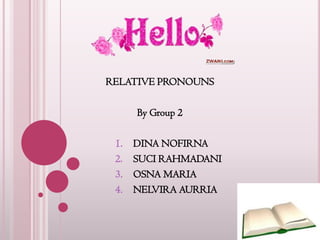
Relative pronouns
- 1. RELATIVE PRONOUNS By Group 2 1. DINA NOFIRNA 2. SUCI RAHMADANI 3. OSNA MARIA 4. NELVIRA AURRIA
- 2. RELATIVE PRONOUNS Relative Pronouns take the place of nouns or pronouns. They are called relative pronouns because they always relate back to something or
- 3. USING RELATIVE PRONOUNS Subject Pronoun 1) Who Who is used to people as a subject. We use who to replace the subject pronouns I, she, he, we and they. Example : The man is My father. The man helped you yesterday. The man who helped you yesterday is My
- 4. 2) Which/That Is used to modify thing that functions as a subject. Example : The letter is in the drawer. The letter came from Jhon. The letter that came form Jhon is in the drawer. The film was not good. We saw the film at Roy theater last night. The film that we saw at Roy theater last night was not good. The cat is sleeping under a table. It has eaten some fish. The cat which has eaten some fish is sleeping under a
- 5. Object Pronoun 1) Whom Whom is used to people as an Object. We use whom to replace the object pronouns me, her, him, us and them. However, the use of whom is becoming less common, especially in the United States, and who is usually used instead of whom. Example : The man is my father. You helped the man yesterday. The man whom you helped yesterday is my father.
- 6. 2) Which Which or that is used to replace the position of a thing that functions as the subject of a sentence. If there’s preposition (of, from, by, with, to, all, off), then put preposition before which. Example : He work for a company. The company sells second-hand ear. He work for a company which sells second hand
- 7. Possession 1) Whose Whose is used to replace the position of possessive adjective (for human only) or for people who have something. We use whose to show possession or relationship. Example : The lady is my neighbour. Her child is in hospital now. The Lady whose child is in hospital now is my neighbour.
- 8. 2) Of which Of which is used to replace the position of possessive adjective (for things). Example : I sent the table back to the store. Its surface is not smooth. I sent the table of which surface is not smooth back to the store.
- 9. TWO TYPES ARE : Defining Relative : Just explain limited to the subject and written without commas. Example : The boy who broke the school- window is Tom. Non-Defining Relative : Explaining not limited only to the subject but there is some more information about the subject itself and written with a comma.
- 10. Two main different groups of Relative Clauses : DEFINING RELATIVE CLAUSES They add information to a sentence They are needed or the sentence would be incomplete They usually go immediately after the noun they refer to NON - DEFINING RELATIVE CLAUSES We add information but the sentence is complete without them They go between commas We can’t use THAT We can’t omit the pronoun
- 11. QUESTION Fill in the blank with relative pronouns (who, whom, which, that, whose, of which) !! 1. The car (......) I bought from Merdine turned out to be a lemon. 2. Pandora, (......) had recently celebrated a birthday, opened the box of gifts. 3. The boy (…..) a motorcycle was stolen yesterday looked very sad. 4. The team (.....) you were watching has won three gold medals. 5. The table (......) was made by the carpenter has broken. 6. Jack (.....) father is a marketing manager in my company is a good basketball player. 7. The dog (......) barked last night caught a thief (......) was running away. 8. The tree (......) fell on the train was over a hundred years old.
- 12. Combine the two sentences of each numbers by using Relative Pronouns !! 9. Jufry is a tender-heart man. Jufry saved me yesterday. 10. I hope Micky can come to my party. I called Micky last night.
- 13. THE ANSWER 1. That 2. Who 3. Whose 4. Whom 5. Which 6. Whose 7. That, Who 8. Which 9. Jufry, who is a tender-heart man, saved me yesterday. 10. I hope Micky can come to my party whom I called last night.
- 14. BIOGRAPHY Azar, Betty Schrampfer. 2002. Understanding and Using English Grammar, Third Edition with Answer Key Gusriani. 2008/2009. Hand Out Bahasa Inggris Kelas X http://www.iscribe.org/english/pron.html (accessed on 19 October 2012) http://www.onlinemathlearning.com/relative-pronouns.html (accessed on 19 October 2012) http://komet-classic.blogspot.com/2010/01/belajar-relative-pronoun.html (accessed on 19 October 2012) http://owl.english.purdue.edu/owl/resource/645/01/ (accessed on 22 October 2012)
